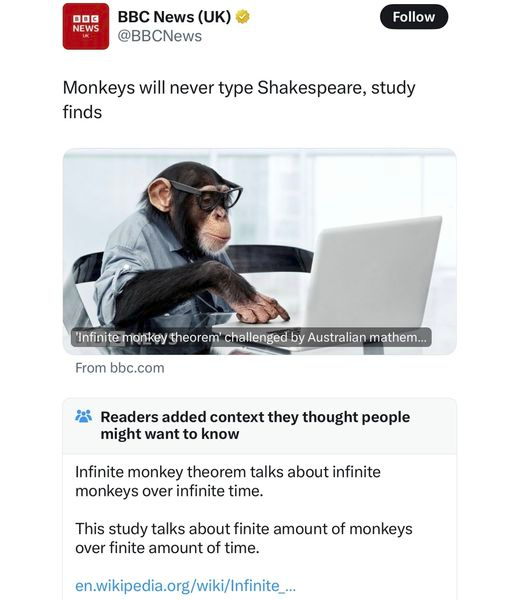this post was submitted on 03 Nov 2024
1145 points (98.6% liked)
Science Memes
12577 readers
2991 users here now
Welcome to c/science_memes @ Mander.xyz!
A place for majestic STEMLORD peacocking, as well as memes about the realities of working in a lab.

Rules
- Don't throw mud. Behave like an intellectual and remember the human.
- Keep it rooted (on topic).
- No spam.
- Infographics welcome, get schooled.
This is a science community. We use the Dawkins definition of meme.
Research Committee
Other Mander Communities
Science and Research
Biology and Life Sciences
- [email protected]
- [email protected]
- [email protected]
- [email protected]
- [email protected]
- [email protected]
- [email protected]
- [email protected]
- [email protected]
- [email protected]
- [email protected]
- [email protected]
- [email protected]
- [email protected]
- [email protected]
- [email protected]
- [email protected]
- [email protected]
- [email protected]
- [email protected]
- [email protected]
- [email protected]
- [email protected]
- [email protected]
- !reptiles and [email protected]
Physical Sciences
- [email protected]
- [email protected]
- [email protected]
- [email protected]
- [email protected]
- [email protected]
- [email protected]
- [email protected]
- [email protected]
Humanities and Social Sciences
Practical and Applied Sciences
- !exercise-and [email protected]
- [email protected]
- !self [email protected]
- [email protected]
- [email protected]
- [email protected]
Memes
Miscellaneous
founded 2 years ago
MODERATORS
you are viewing a single comment's thread
view the rest of the comments
view the rest of the comments

No, it isn't, that's a misunderstanding of how independent random variables behave. Even with an infinite number of trials, in this case there is never a guarantee of a particular outcome.
Consider a coin flip, 50/50 chance of either getting heads or tails on each flip. Lets say we do an infinite number of flips, one by one, so that we end up with an infinite ordered set of outcomes, like so: {H, T, T, H, ... }. Now, consider the probability of getting a particular arrangement of heads/tails in this infinite list, like the one I wrote before. You can't calculate a probability for each arrangement - there are an infinite number - but it should be clear that each arrangement is equally likely, right? Because {H, ...} is just as likely as {T, ...}, same with {H, H, ...} and {H, T, ... } and so on and so on. In other words the probabilty of getting all heads on infinite coin flips is the same as the probability of getting any other combination.
In the same way, the infinite monkeys are doing 'coin flips' involving more than 2 options. Lets just assume they have 26 keys, one for each letter, and assume they hit each of them with equal probability. In the same way, for an individual monkey the probability of going {a, a, a, a, a, a, ..., a} is the same as the probability of the same sequence with hamlet somewhere (in a particular position that is - the probabilities are only equal when we consider exactly one arrangement). What might make it more intuitively clear is that even after an infinite number of trials you only have one sequence of letters (or set of sequences, with infinite monkeys). It's clear that there are other possible sequences - like only the letter a - and these all have a non 0 chance of having arisen given a different infinite set of monkeys for a different infinite time period.
It's easy to be misled here! If we return to the coin flip example, the probability of flipping at least 1 head after infinite coin flips approaches 1. The limit of P(at least one H) as the number of flips approaches infinity is 1. But this is a limit! You never reach the limit, even considering infinite situations.
0.99999... repeating equals 1. Not close to 1. Equal to 1. The monkeys will necessarily type hamlet somewhere in the sequence. If your group of monkeys hasnt typed it yet, double the number of monkeys.
A monkey could type any infinite sequence of letters if it types at random. Since infinite sequences of single letters, repeating patterns, and those containing hamlet except one letter is wrong every time are all possible infinite sequences, it's possible that the money produces one of them.
Probability behaves strangely in infinite situations. A single monkey will almost surely produce the complete works of Shakespeare in infinite time... But this is partially a flaw of infinity in general.
As another example, let's say your monkey produces an infinite sequence containing hamlet. What is the probability of that particular sequence arising? It's 0. There is no chance of any particular sequence arising... And yet that one did arise! It was almost surely not going to be that one, but it was. The probability of any single infinite sequence arising is 0, but nonetheless one of them will be the outcome.